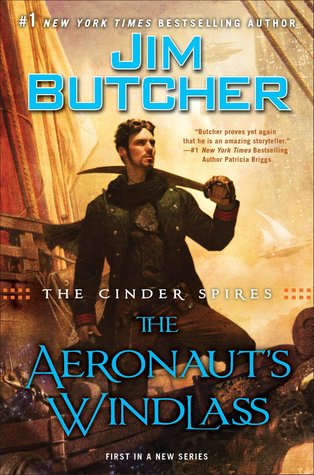 Some people are rabid Jim Butcher fans. I'm not. I read Storm Front, the first book in his best-selling Dresden Files series, and while it was good, it wasn't really my thing and I didn't read further. But when I saw The Aeronaut's Windlass, the first book in his new Cinder Spires series, I was intrigued. Windlass is a steampunk-inspired fantasy, which is the best sort of steampunk in my view. I like the fantastical elements that crystals (a la "Atlantis: The Lost Empire") and talking cats and the warriorborn and weird and deadly creatures can add to the mix.
Some people are rabid Jim Butcher fans. I'm not. I read Storm Front, the first book in his best-selling Dresden Files series, and while it was good, it wasn't really my thing and I didn't read further. But when I saw The Aeronaut's Windlass, the first book in his new Cinder Spires series, I was intrigued. Windlass is a steampunk-inspired fantasy, which is the best sort of steampunk in my view. I like the fantastical elements that crystals (a la "Atlantis: The Lost Empire") and talking cats and the warriorborn and weird and deadly creatures can add to the mix.Let me tell you this: I can see Butcher's genius here. In Windlass, he sets up a mystical world in which humanity lives in a series of far-flung towers called the Spires, each one a state in and of itself. Captain Grimm is a privateer for Spire Albion, which has long been locked in a trade war with Spire Aurora. As the book begins, we see a young noblewoman named Gwen march off to join the Spirearch's Guard, and then the trade war with Aurora suddenly turns into a hot war, as Albion is attacked. Joining Captain Grimm on the page are Gwen, her cousin Benedict, another member of the Guard named Bridget who is technically an aristocrat but doesn't seem to know it, and the cat Rowl. Turning up a little later are a pair of etherialists, people who can see and manipulate the fantastic energies that power airship, provide light, and generate electricity: Ferus, the master, and his apprentice Folly. This bunch of misfits teams up to hunt down an invading Auroran force, a story which is both compelling in and of itself and which sets up a future path of conflicts hinted at by Folly's prophetic dreams.
The narrative moves between the main characters, though given that the book's description focuses only on Grimm, I'm moved to believe that he's the character who will be the main in the entire series. All of the chapters are third-person, and of them I liked Gwen and Bridget best, though I might just be biased towards female main characters. I liked Rowl's chapters the least; while I found the set-up and idea of intelligent cats interesting, I didn't really like Rowl as a point-of-view character. He annoyed me more than any other character.
The thing I liked least about this book was the Enemy. It's set up pretty early on that the group, and Spire Albion in general, is going up against some Big Bad. The Big Bad is a concept that I really don't like in any book. I want villains who are multi-faceted and have clear motives other than just "being evil," but that was all Butcher provided in this book. It's clearly a setup for future books, but he gave me no reason to believe that the villain is a character who will gain any real amount of depth as the series go on. I hope I'm mistaken, because having a Big Bad as a main antagonist (even if there are other antagonists with their own motives sprinkled throughout, as there are here) tends to remove reality from the story. All of the biggest and baddest people in history had real, human motives for what they did; Hitler might have hated Jews, gays, gypsies, and a lot of other people, but he also had a genuine desire to improve the lives of the people he viewed as "his." As we all know, that didn't exactly go well for anyone involved, but still: it is what it is. Granted, it seems that Butcher's Big Bad might not be exactly human, and therefore it could be argued that he/she/it isn't subject to human motives and emotions, but still. I hope there's some dimension there than "it's big and bad and wants to destroy humanity" in the future.
There are a few inconsistencies here, too. The most obvious one that came to mind was when Folly, a character who for the duration of the book had only been able to communicate with people by speaking to a jar of crystals instead, suddenly began talking directly to Grimm with no explanation at all. Is this going to be something that's explored further? Folly's mad, and Butcher said so blatantly at several points that her madness should only get worse. So where does this sudden ability to speak like a normal person come from? Little things like this don't necessarily ruin the story, but they are a bit jarring when they go directly against what has already been established without any apparent reason for the about-face.
I really like Butcher's new world and look forward to reading about it more, though I imagine it'll be a while until the next book comes out. Despite its flaws, it seems to be a very unique setting and premise in the current world of fantasy, and I hope he can maximize its potential.
3.5 stars out of 5.
No comments:
Post a Comment